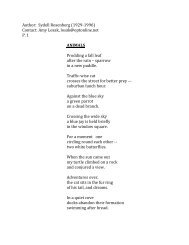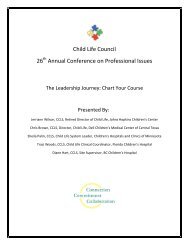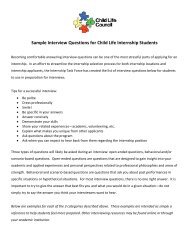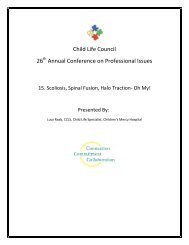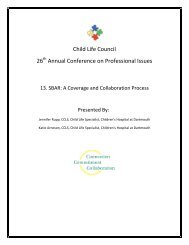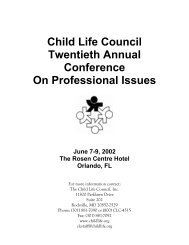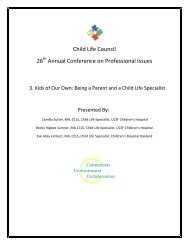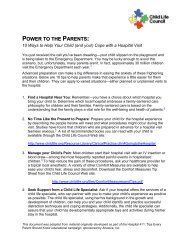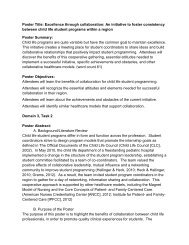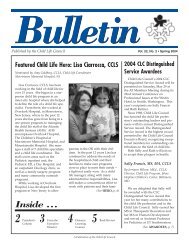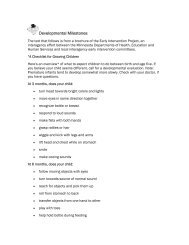Child Life Clinical Internship Curriculum - Child Life Council
Child Life Clinical Internship Curriculum - Child Life Council
Child Life Clinical Internship Curriculum - Child Life Council
You also want an ePaper? Increase the reach of your titles
YUMPU automatically turns print PDFs into web optimized ePapers that Google loves.
Objectives<br />
In the process of completing this module the child life intern will:<br />
1. Describe the variety of losses that may be experienced by families in health care and<br />
note examples of family grief as they are encountered during internship. Discuss<br />
appropriate provision of palliative care before end‐of‐life.<br />
2. Assess the needs of families who are grieving loss or entering end‐of‐life situations,<br />
demonstrating awareness of the cultural and familial strengths and vulnerabilities that<br />
may contribute to the families’ coping styles.<br />
3. Assess family members’ preferences related to the participation of their child in<br />
decision‐making and identify ways to support the family in sharing all perspectives in<br />
the planning of care goals.<br />
4. Demonstrate the ability to collaborate with the family and medical team to gather and<br />
share information pertinent the family’s specific needs for support.<br />
5. Plan and provide psychosocial interventions for patient and family.<br />
6. Evaluate efficacy of interventions provided, adapting as needed.<br />
7. Document child life interventions in the medical record.<br />
Required Activities<br />
The intern will:<br />
1. Observe and discuss with CCLS various examples of loss experienced by families served,<br />
identifying families’ expressions of grief and their coping strategies.<br />
2. Discuss and /or demonstrate methods of gathering information from patients and<br />
families in order to assess their needs and wishes during a palliative care/bereavement<br />
situation.<br />
3. Describe children’s understanding of death as related to the cognitive stages of<br />
development.<br />
4. Create a list of developmentally‐appropriate interventions for explaining death and for<br />
encouraging expression of feelings when supporting children and adolescents in<br />
bereavement.<br />
5. Assemble a personal bibliography of books and other effective materials that can be<br />
utilized to support children, adolescents and adults facing a variety of losses in addition<br />
to bereavement.<br />
56



